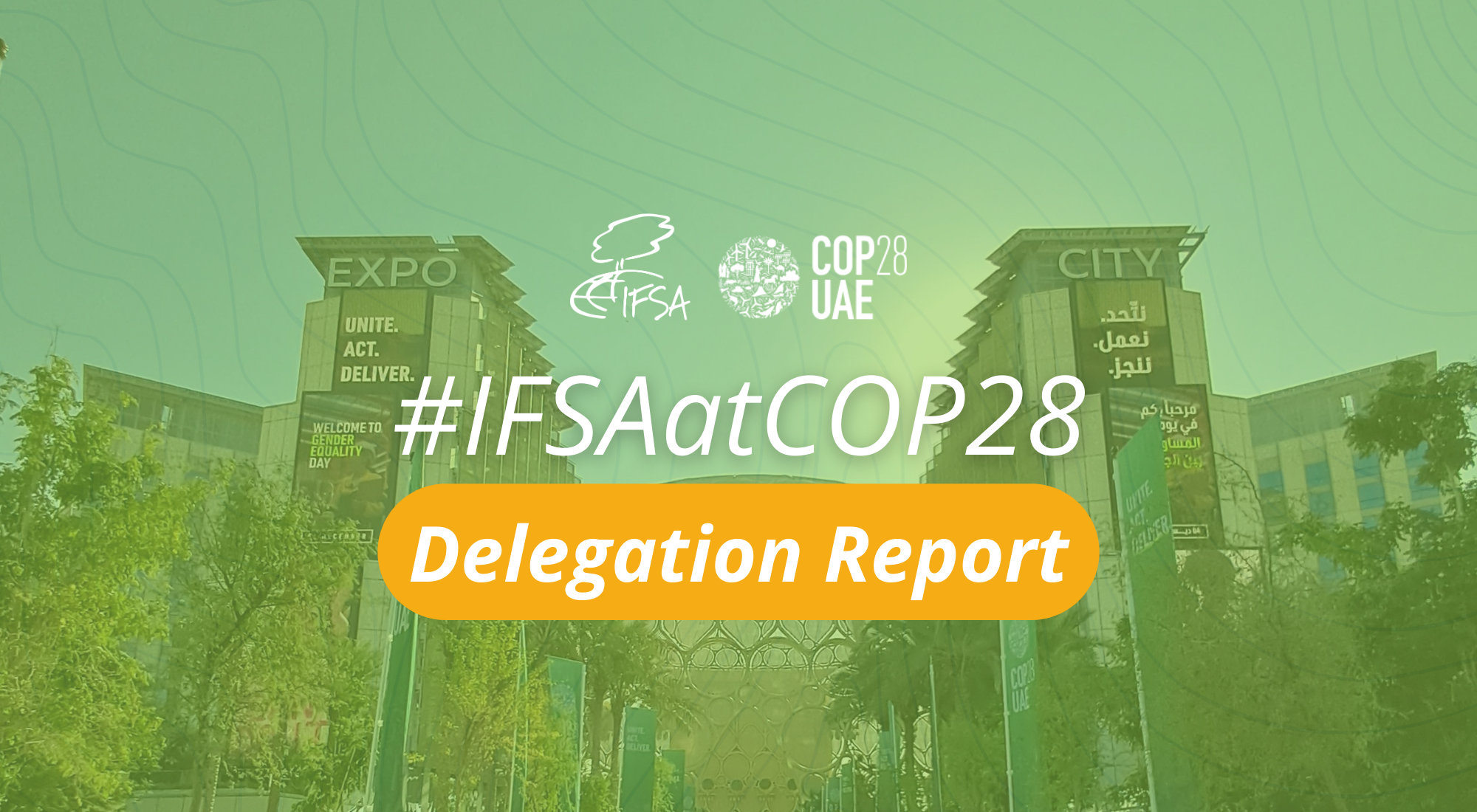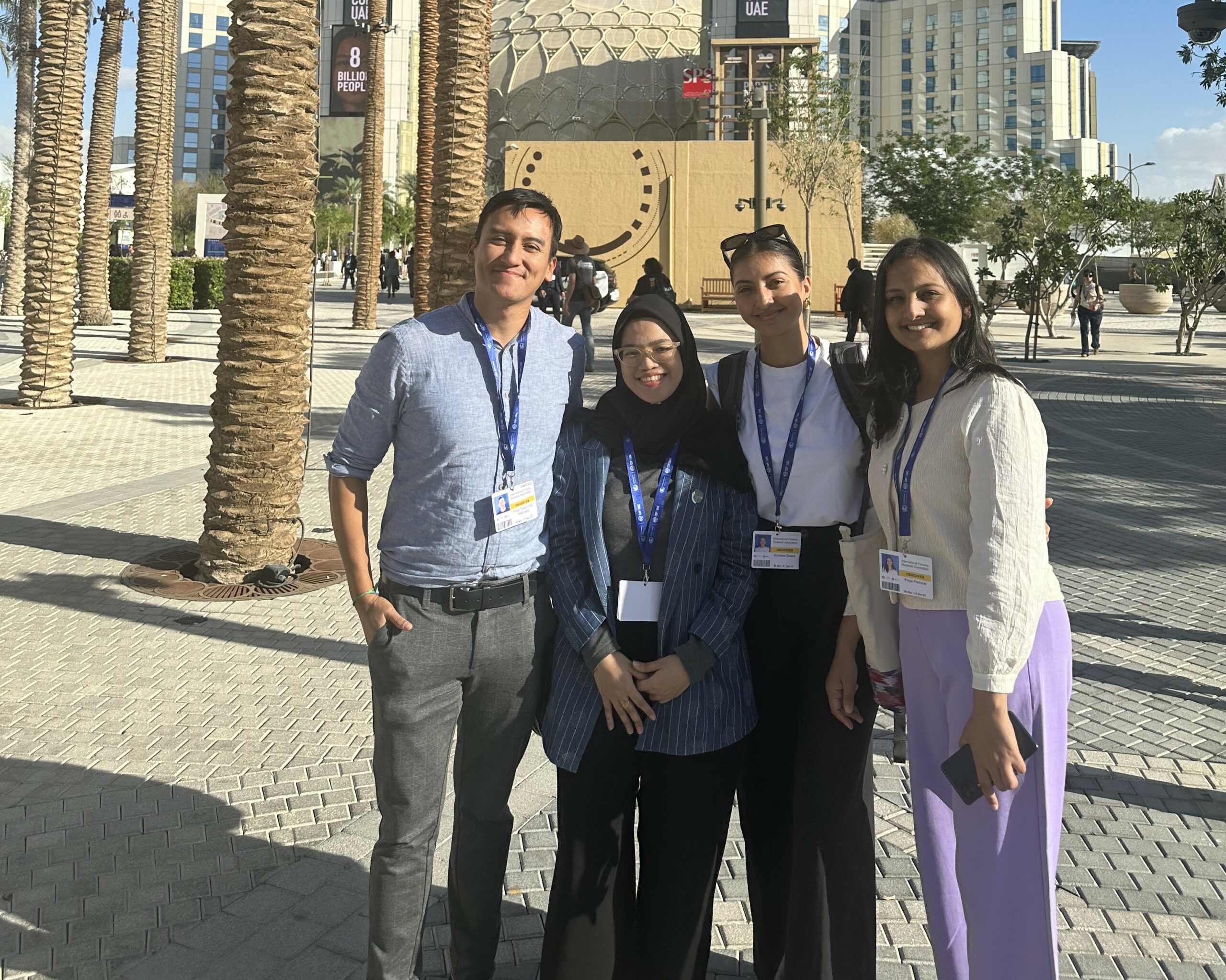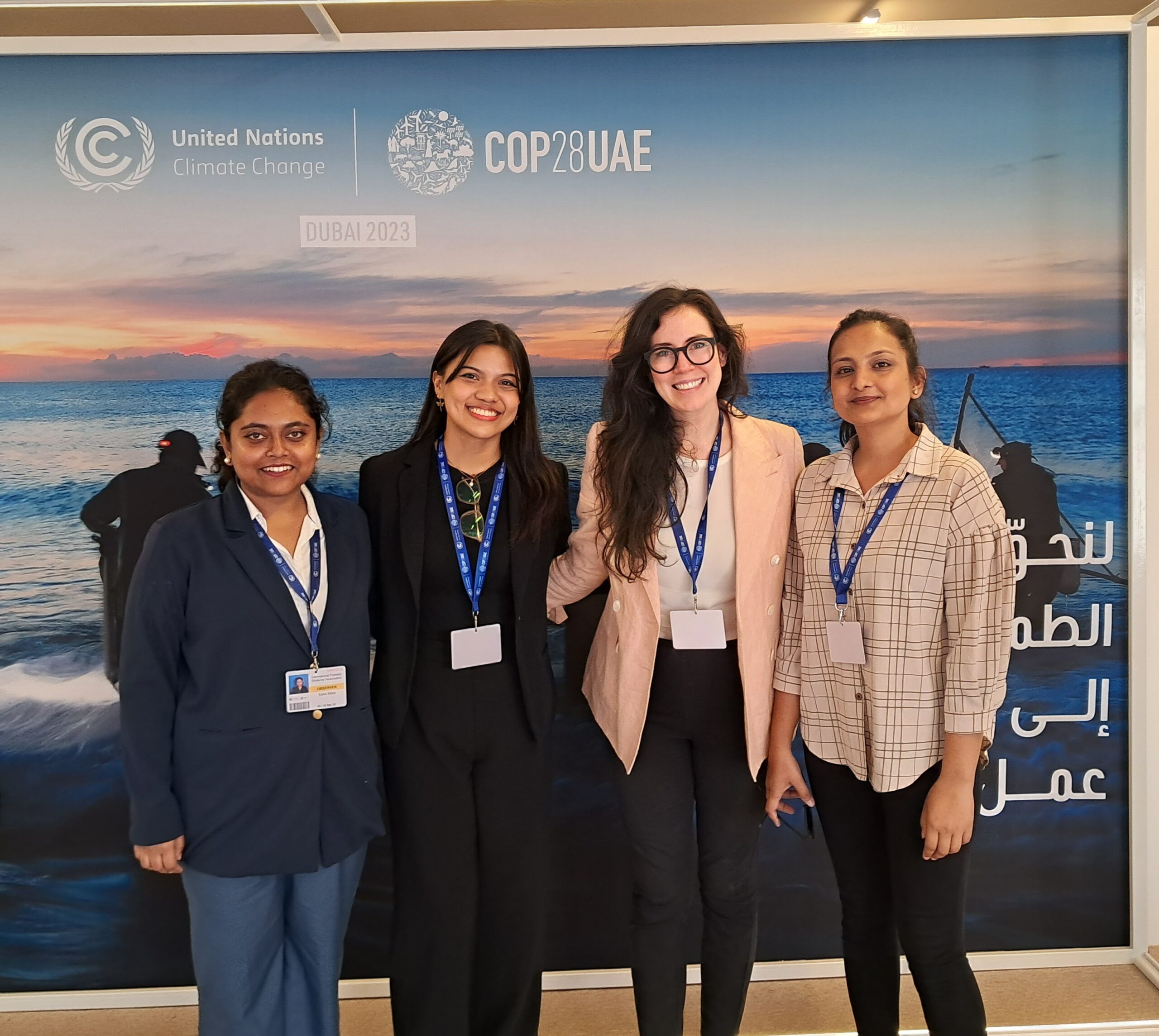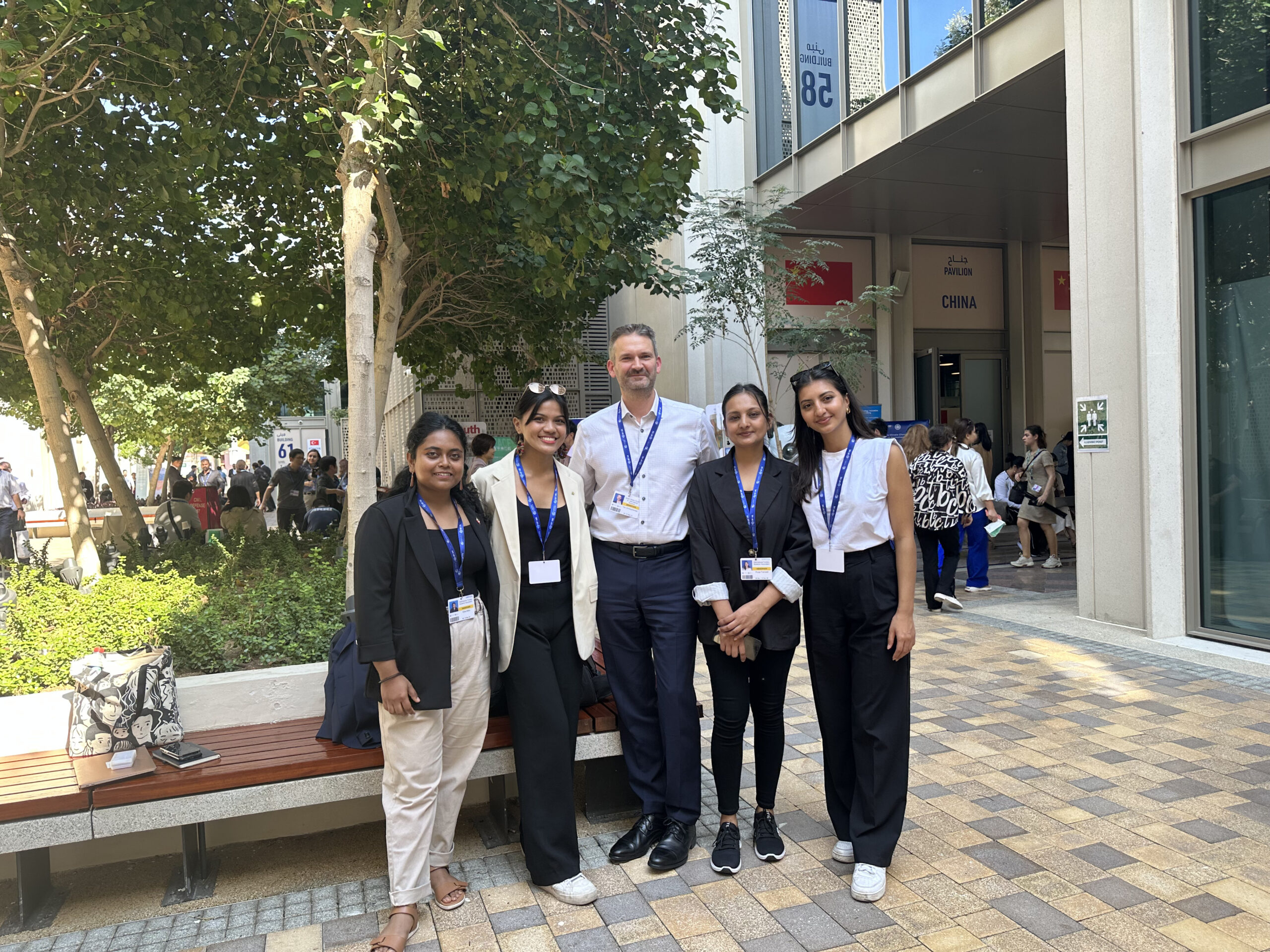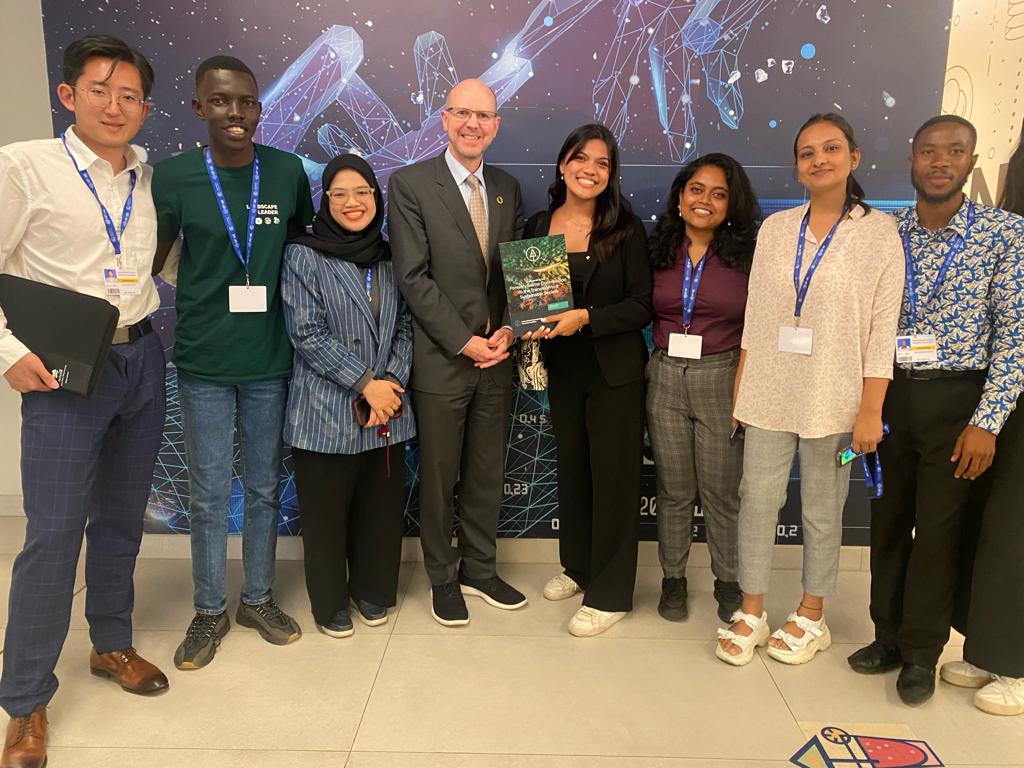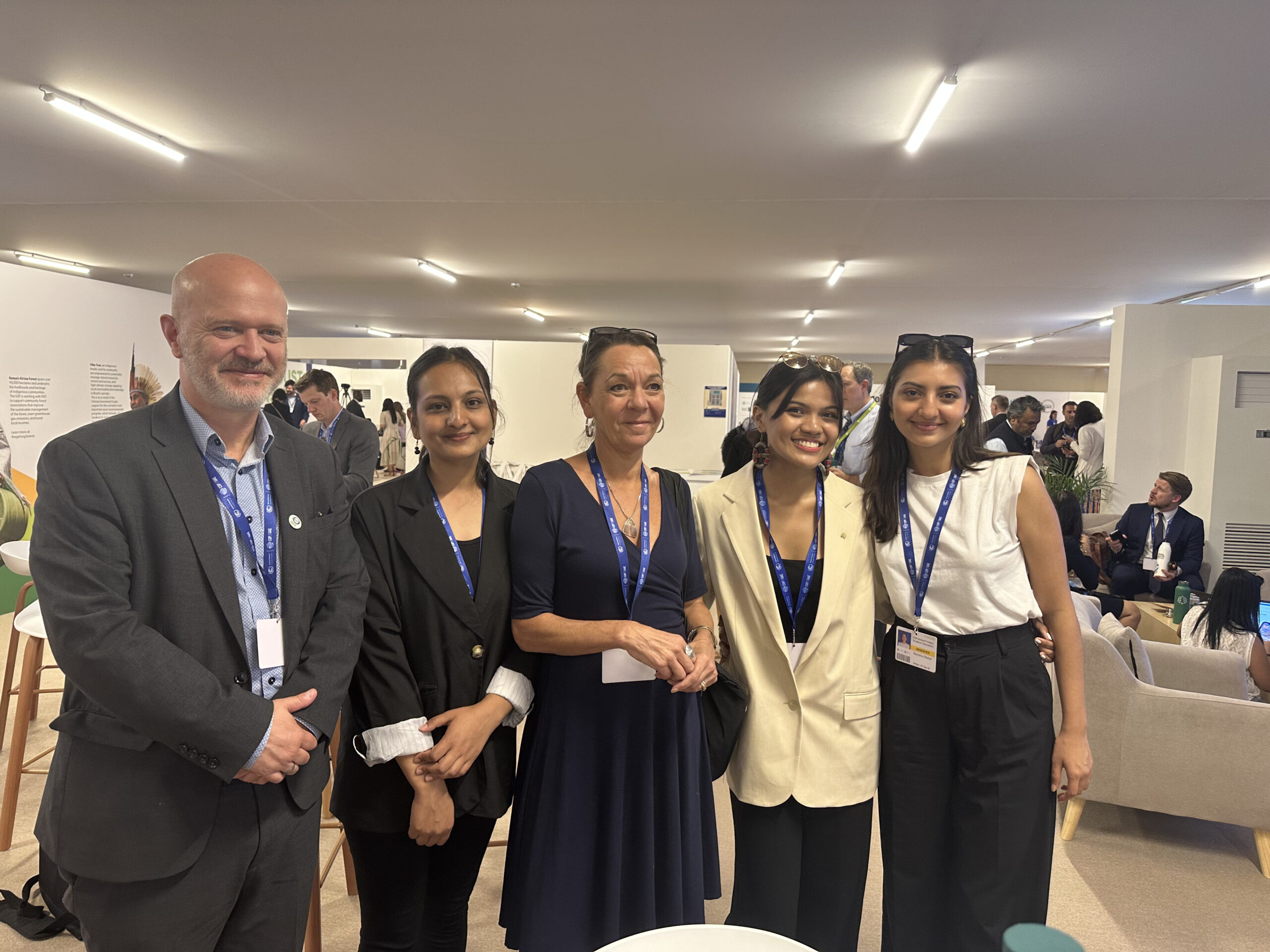IFSA’s UNFCCC COP 28 UAE Experience
Background of COP
The United Nations Conference on Climate Change serves as the world’s most extensive annual gathering dedicated to addressing climate-related challenges.
The 28th session of the UNFCCC Conference of the Parties took Place in Expo City, Dubai, United Arab Emirates from 30th November to 12th December 2023. It brought together members from 198 parties, observers, and media with more than 80,000 delegates, which is almost double compared to previous years.
IFSA’s Participation
This year, the IFSA delegation comprised 12 delegates from 5 distinct regions: Asia (Nepal, Philippines, Indonesia, and China), North America (USA), South America (Peru), Europe (Germany), and Africa (Ghana and Uganda).
Throughout the conference, our delegation had an active engagement in a myriad of platforms like side events, meetings, networking sessions, receptions, and negotiations. One of our most significant engagements during COP 28 was our participation as a Youth Co-host in the Food Systems Pavilion, along with 12 other youth-led organisations. For more information about our delegates, visit our Pre-COP article here.
Organised and co-organised sessions
Leveraging Food Security: Unleashing the Benefits of Horticulture and Urban Forestry on Nutrition and Health
Diverse mechanisms in addressing food security and climate change have become our main priority in overcoming hunger and health issues amid climate change.
In this side event organised by IFSA, IAAS, and CGIAR, the extraordinary panel highlighted the significant impact of horticulture and urban forestry on the well-being of society, especially how indigenous knowledge on these topics is instrumental in enhancing livelihoods. The panellists identified several main challenges in promoting food system transformation, specifically land, financing, and current urban policies that do not consider trees as crucial elements in cities. In this regard, the youth’s role as community mobilizers is essential to raise awareness and collaborate with various stakeholders to create necessary changes within the system.
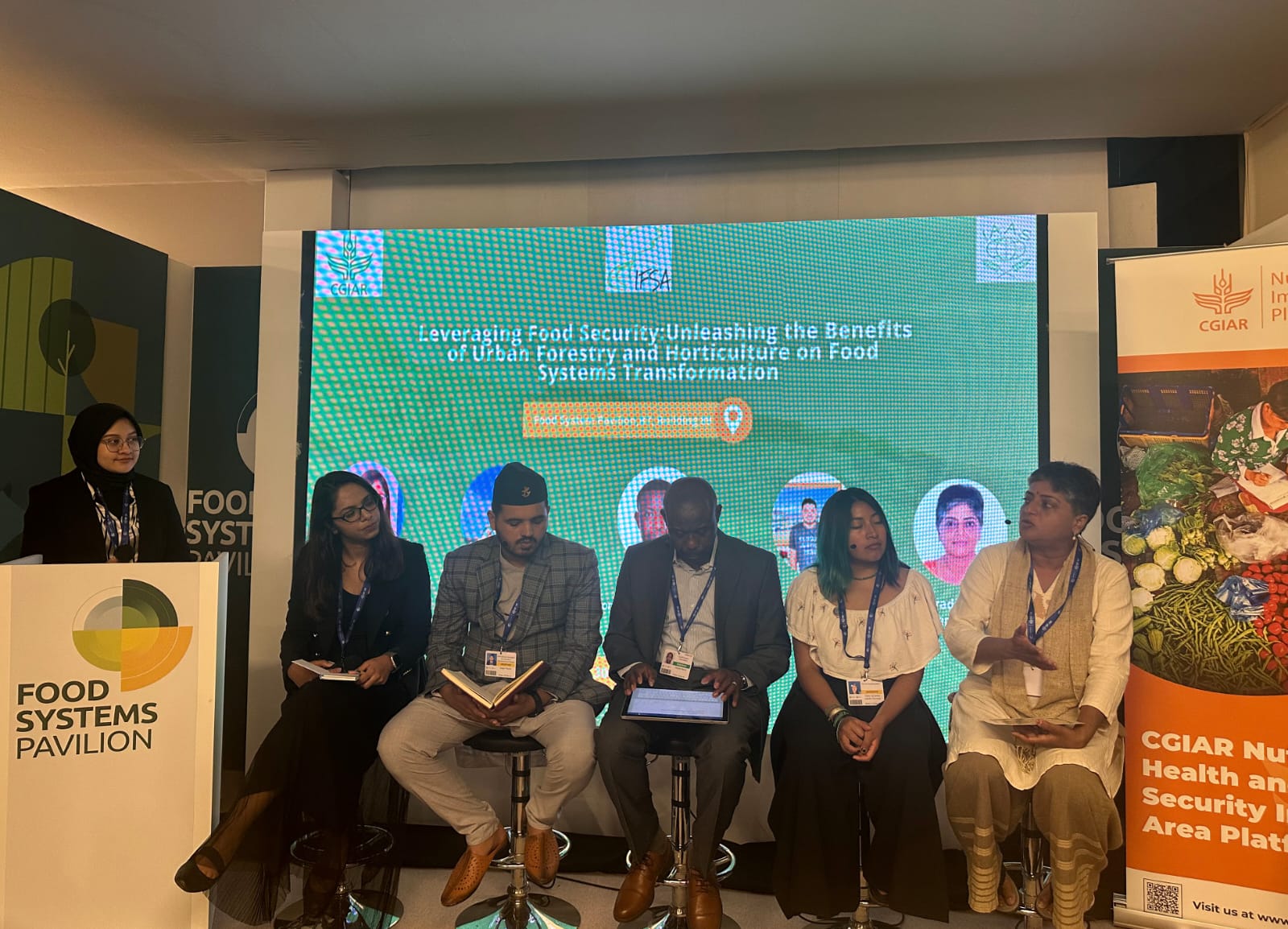
Faiha Azka Azzahira moderates the IFSA co-organised side event at Food Systems Pavillion. Photo: IFSA
Ms. Faiha Azka Azzahira, Membership Councilor of IFSA, moderated the discussion between our panellists Xananine Calvillo (LEGAIA), Pramisha Thapaliya (WFF), Sagar Poudel (IAAS), Sharada Ramadass (IAFN), and Masso, Cargele (CGIAR).
Forest Guardians: Interconnecting Generations for a Climate-Resilient World
Climate change is a global issue that affects people of all generations—older individuals have seen the degradation of natural environments over time, and understand the urgency of protecting forests and preserving the planet for future generations while younger generations bring fresh perspectives, energy, and a profound determination to drive change.
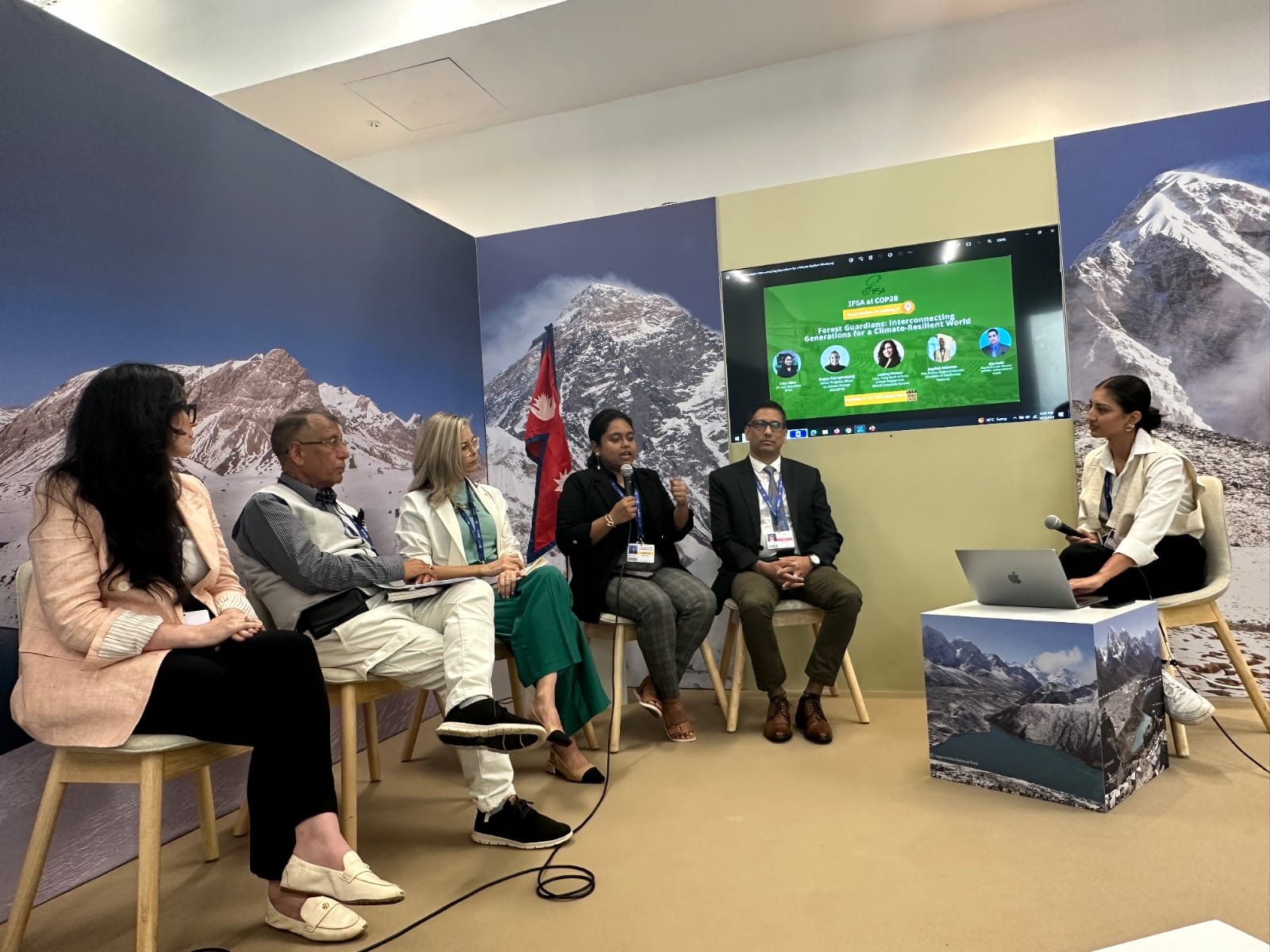
Esha Mitra speaks about intergenerational collaboration, along with Moderator Bandana Dhakal and other speakers in IFSA organised side event at Nepal Pavilion. Photo: IFSA
In this IFSA-organised side event, stakeholders from diverse backgrounds and generations were brought together to discuss the power of intergenerational contributions in achieving a climate-resilient world. It enabled the identification of common challenges and opportunities for collective action, fostering a sense of interconnectedness and shared responsibility. The diverse panel underscored the need to commit to youth engagement, as well as their empowerment and education, to involve them in climate policy development and decision-making processes. They also provided comprehensive strategies for achieving climate resilience and sustainable forest management while ensuring intergenerational collaboration.
The panel for the discussion boasted a diverse and knowledgeable lineup of speakers, consisting of Esha Mitra, the Outgoing Head of the International Processes Commission at IFSA; Regan Pairojmahakij (RECOFTC); Lindsey Prowse (1t.org North America & World Economic Forum); Jagdish Kishwan (Coalition for Rainforest Nations); and Ajay Karki, Deputy (Government of Nepal), and IFSA delegate, Bandana Dhakal, as the moderator.
Food Youth Leaders Reception
IFSA co-hosted the Food Youth Leader Reception on 8 December 2023, together with 10 other youth organisations—Change for Planet, Foundation for Environmental Stewardship, IAAS, Youth4Nature, Youth Environment Europe, Green Africa Youth Organization, YPARD, Youth in Landscapes Initiative, EmponderaClima, and YOUNGO. The event aimed to provide young climate and food systems leaders with a space to build supportive networks for collaboration and partnerships, with around 40 participants joining.
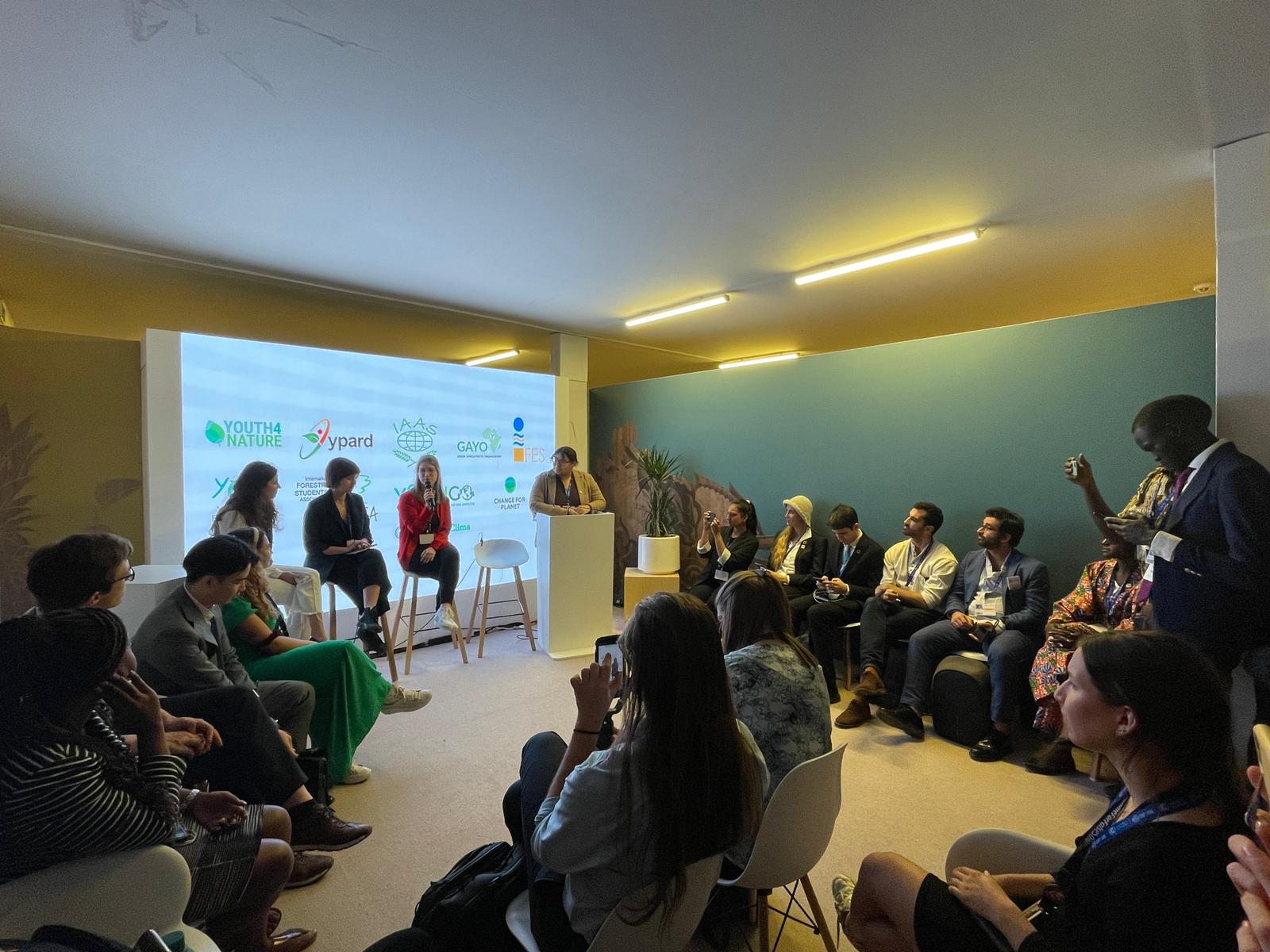
Youth leaders networking session at Food4Climate Pavilion. Photo: IFSA
Representatives from a few of the co-host organisations underlined their achievement in advancing food systems advocacy efforts at COP 28 and ways that other youth leaders can get involved. The forty participants mingled with members from various youth organisations during the “slow dating portion” and shared their experiences as food systems advocates while enjoying vegan finger foods and drinks.
Climate Trailblazers: Harnessing the Power of Youth-led Initiatives on Sustainable Land Management and Climate Action
The necessity to restore nature and adapt forests and natural landscapes to climate change is indisputable. At the same time, young voices call for climate action and more opportunities to become involved in policy processes and implementation projects that aim to counteract climate change.
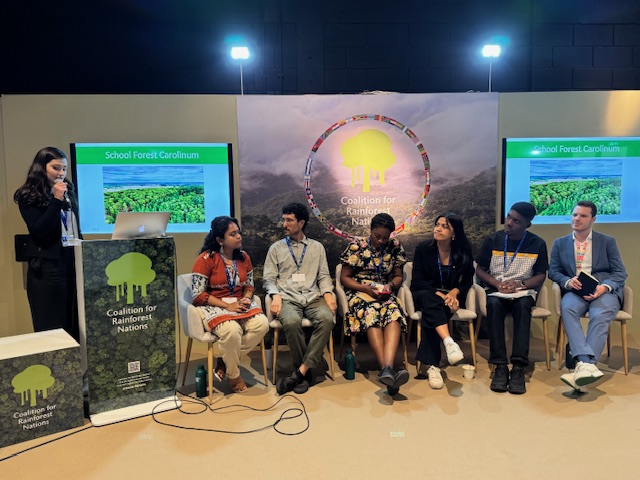
IFSA organised a side event at the Pavilion of Rainforest Nations Conservation Alliance. Photo: IFSA
This session organised by IFSA aimed to provide a platform for dynamic youth organisations such as Youth4Nature, International Association for Students in Agriculture and Related Sciences (IAAS), Global Youth Biodiversity Network (GYBN), School Forest Project, and YPARD to present their backgrounds and share their initiatives that address the urgent challenges of climate change through sustainable land management and climate action. Overall, the session facilitated a rich exchange between the panellists and the audience, discussing how to best promote youth integration into sustainable land management, restoration, and climate adaptation projects in their respective regions. They all expressed their interest in connecting their initiatives more actively to expand their impact and learn from each other’s experiences on a more regular basis after leaving COP28.
Rooted Resilience: Youth-led Small Table Talks on Global Agroforestry Innovations
In a side event co-organized by IAAS and YPARD, the panellists showcased their diverse experiences of working in agroforestry systems and highlighted the youth’s role in advancing innovations.
IFSA President, Isabelle Dela Paz, discussed her personal experience working in the Sustainable Farming in Tropical Asian Landscapes (SFITAL) project of CIFOR-ICRAF and how it works to promote sustainable cacao production in Davao de Oro, Philippines. However, she acknowledged that despite extensive progress in this aspect, there is still a lack of youth involvement and interest in the industry. Therefore, Isabelle emphasised the need to nurture young people’s interest in modern technology to promote cacao-based products on e-commerce platforms.
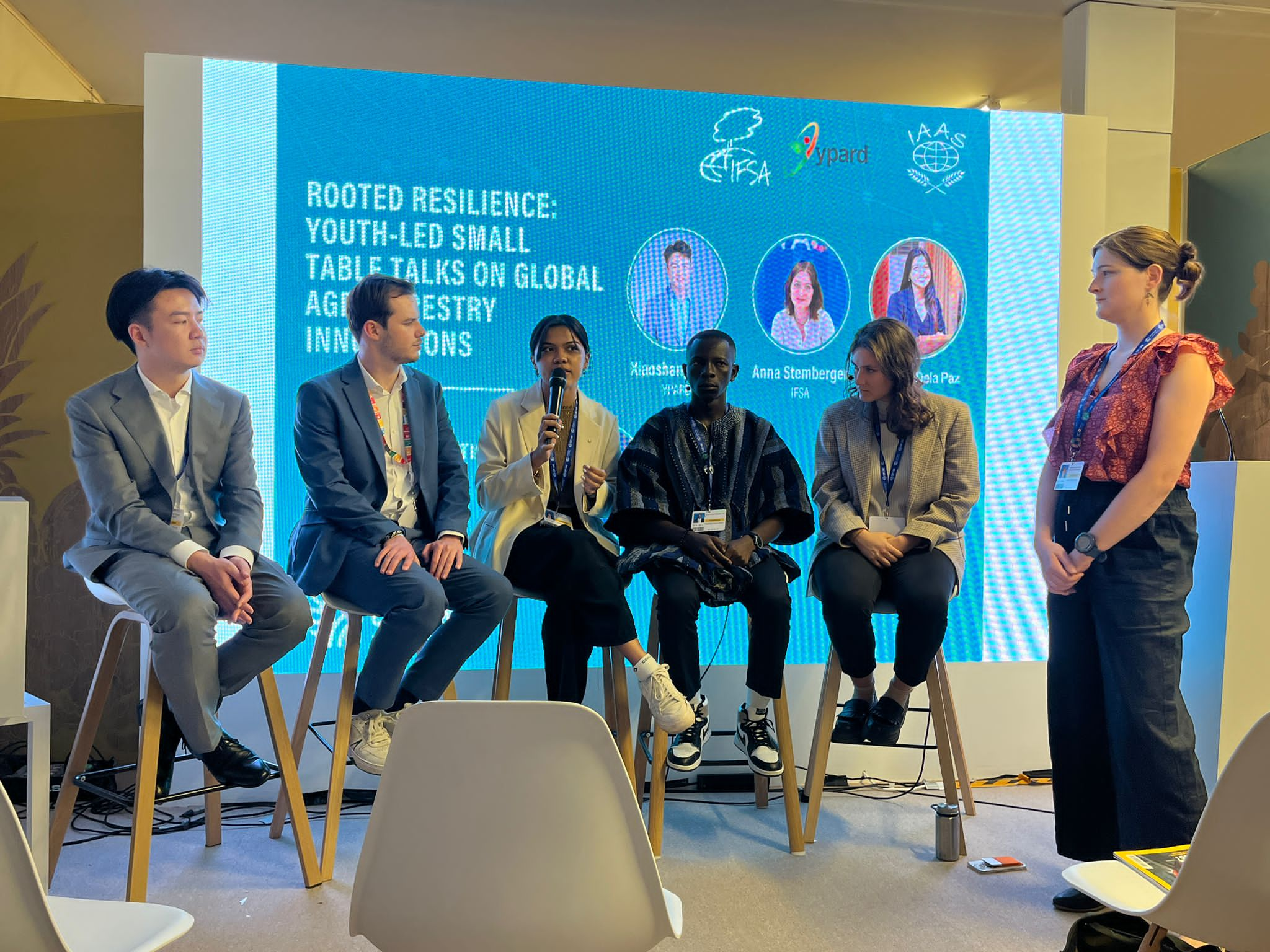
IFSA President, Isabelle Dela Paz, shares her experience in agroforestry innovations. Photo: IAAS
With existing capacity-building programs on cacao-based agroecological practices and e-commerce in the Philippines, she underscored the youth’s potential in the digitalization of agroforestry systems. Additionally, she also outlined her research findings on the financial costs and benefits of urban agroforestry systems and farmers’ adoption decisions on its development.
Bolstering of Youth Climate Action on Global North and Global South
It is indisputable that the younger generation is essential to sustainably address climate change both in the Global North and South. This panel discussion empowered and equipped the younger generation to become active supporters in overcoming climate change, facilitating knowledge exchange between youth in the Global North and Global South.
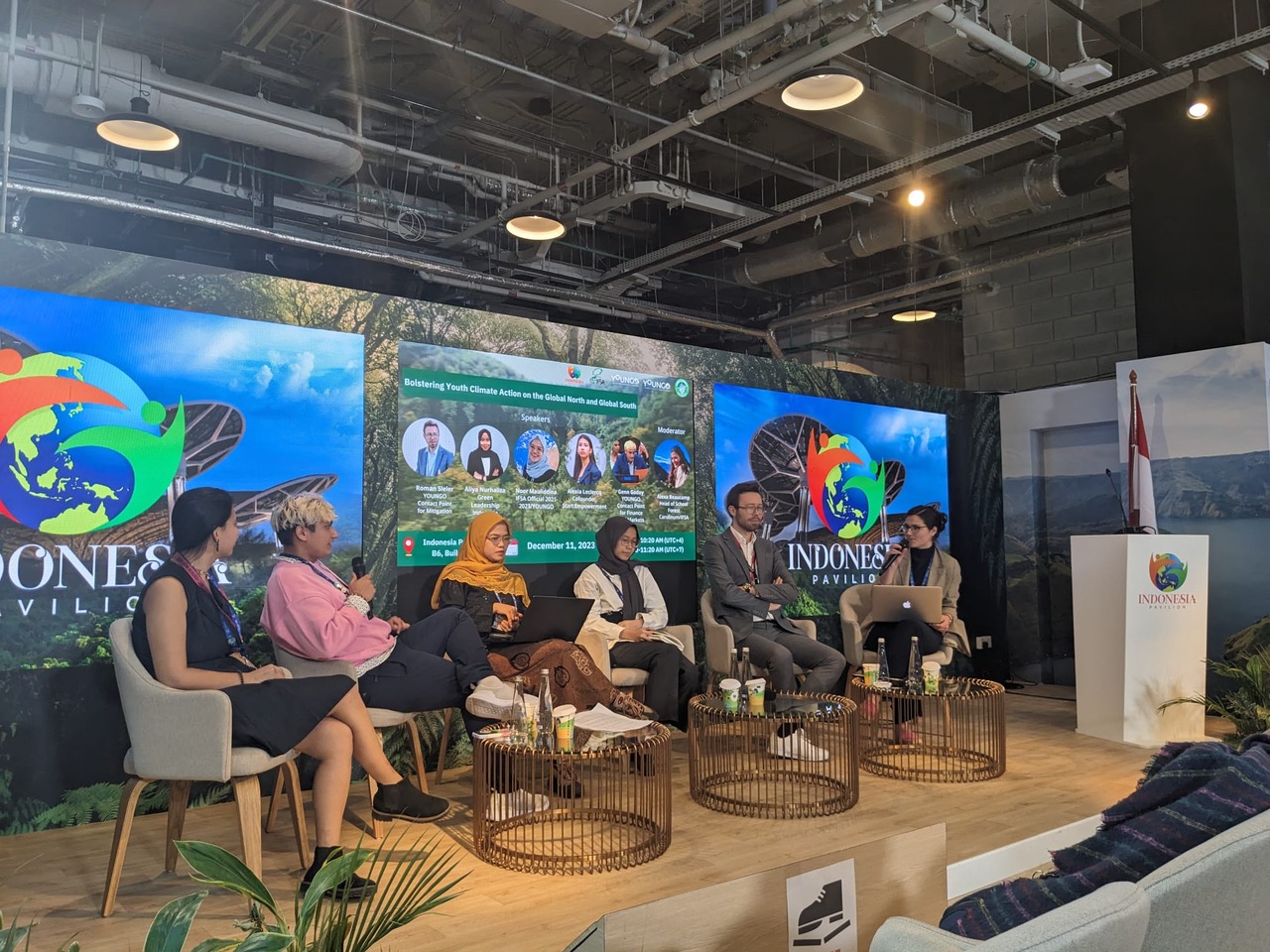
IFSA delegates, Alexa and Dina, participating in the side event at the Indonesian Pavilion. Photo: IFSA
Each of the panellists presented their experiences and challenges in climate action and what support would be needed to overcome them. They shared moments of frustration and how to deal with it constructively. The audience was then split into five groups: Climate Action on Land, Energy and Sustainability, Education and Partnership, Financing for Youth, Health, and Indonesia Youth. Guided by a co-facilitator from a youth organisation, the groups discussed expectations from the government and private sector to support youth in their field of climate action. Finally, they shared perspectives on how the global north and south youth engagement and collaboration can be strengthened in their respective focus area.
This session included speakers Mr. Roman Sieler (YOUNGO), Ms. Aliya Nurhaliza (Green Leadership Indonesia Batch 3), Ms. Noor Mauliddina (IFSA), and Ms. Alicia Leclercq (Start.empowerment), and moderator, Alexa Beaucamp (IFSA).
Other event engagements
Forestry communities: renewable energy and the bio-economy
Forest products, including timber, are crucial for climate mitigation. To maintain 1.5°C, more timber is needed in construction, packaging, and various products to replace plastics. Sustainable supply must match demand. Mills worldwide are adopting renewable energy to reduce their carbon footprint, with timber biomass being used for solar panels.
The discussion unfolded with diverse perspectives on forestry and forest products in renewable and bioenergy, the implementation of tree models, afforestation and plantation projects, farmland and forest land controversy and their relations, the importance of conserving native areas, and going beyond traditional technologies.
IFSA delegate, Dina, shares her experience as a speaker at an AFPA-hosted side event. Photo: IFSA
IFSA delegate Noor Maulidina shared her valuable experience during her internship in a National Park and highlighted insights on farmland, forest land conflicts, and the nuanced meanings of deforestation in different regions. Dina brought a fresh perspective from the younger generation, emphasising the importance of sustainable forest management in the context of renewable and bio-economy solutions.
The session commenced under the moderation of Hon Joel Fitzgibbon, former Australian Minister of Defence and Minister for Agriculture, Fisheries and Forestry, featuring other speakers; George Li (Association for Renewable Energy Association UK), Suzano (Director of International Projects), Fernando Bertolucci (Chief Sustainability Research and Innovation Officer Mauritius), Gunsham Seeborun (Farmers in Agriculture, Livestock, Cooperative, Organic Network) and Noor Mauliddina (International Forestry Students Association).
Harmony in Action: Nature-based Solutions in Tropical Asia
The side event showcased the success stories of nature-based solutions implementation in Tropical Asia, for their mission of reducing greenhouse gas emissions and improving land management.
Isabelle Dela Paz, IFSA President, participated as a youth panellist in the event. Upon discussing the background of IFSA and the nature of Local Committee (LC) projects, Isabelle proudly shared the “BakaJuan Project”, a youth-led flagship project of her LC, AFFS-UPLB, that aims to plant and monitor mangrove trees in Quezon, Philippines. Given that one of the most significant benefits of mangroves is the increasing fish population, she outlined that the LC has been actively working with the local community in all stages of the growing process as they primarily depend on fishing for their livelihood. Isabelle also shared that the project is in partnership with government agencies to support the provision of land grants and tree seedlings.
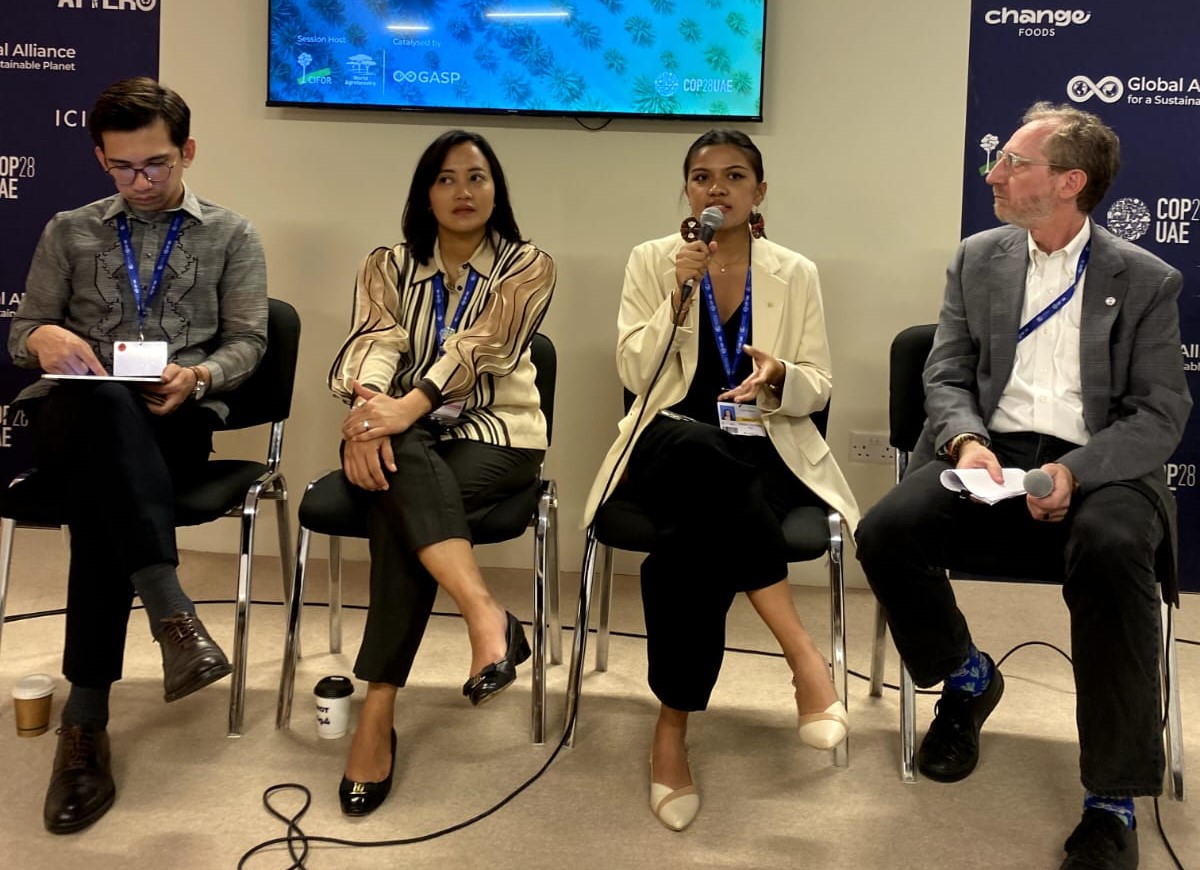 IFSA representative, Isabelle Dela Paz, discusses the LC-led mangrove project in the Philippines at COP 28 side event. Photo: IFSA
IFSA representative, Isabelle Dela Paz, discusses the LC-led mangrove project in the Philippines at COP 28 side event. Photo: IFSA
However, young people often need further financial and technical support to ensure the sustainable implementation of this kind of NbS project”, she emphasised. In addition, young people do not have adequate access to opportunities that would grant them on-ground experiences and interaction with local communities, limiting their ability to grasp such perspectives fully. As a call to action, Isabelle highlighted the need for multi-sectoral collaboration in providing capacity-building and financial and technical assistance to young people and their project implementation. “Once these needs are met, only then can we achieve the youth’s genuine involvement in tackling climate change through NbS solutions”, Isabelle emphasised.
The side event was organised by USAID, CIFOR-ICRAF, and the Global Alliance for a Sustainable Planet (GASP).
Advancing Sustainable Forest Management: Financing Mechanisms for Carbon and Biodiversity
Sustainable forest management (SFM) stands at the forefront of global efforts to balance environmental conservation, economic development, and societal needs. In implementing this kind of practice, securing sustainable financing and investments, and prioritising the well–being of indigenous communities are vital.
This side event highlighted effective forest management practices and sustainable financial mechanisms for ensuring ecosystem conservation and socio-economic benefits for communities from a multi-stakeholder perspective, including youth. To ensure effective implementation of nature-based solutions, funding resources are urgently needed given that they tackle the challenges of climate change and sustainable development. IFSA stressed that the youths’ role is expressed through networking and collaborating with other young people, and even potentially other stakeholders across different regions, advocating for forests and raising awareness for tangible actions.
Faiha Azka Azzahira represented IFSA in the panel as the Membership Councilor and President of the IFSA LC Gadjah Mada.
Experiential Climate Education: The role of Student and youth-led organisations
Young people play a vital role in demanding more climate action worldwide. However, many young people are increasingly disconnected from nature, have little awareness of the causes and consequences as well as potential solutions to climate change, and lack the skill set and required experience to become active. This session offered five speakers to present and discuss their concerted efforts to promote experiential climate education (ECE) as part of their research and youth-led organisations.

IFSA delegate, Alexa Beaucamp, shares her experience in the School Forest Project as a Speaker at MTU Pavillion. Photo: IFSA
IFSA Delegate, Alexa Beaucamp, shared how her project School Forest Carolinum offers young people to be integrated into the sustainable land management of 2500 hectares in the North of Germany, sharing insights of a very concrete pilot project that combines E, CE, and citizen science approaches with secondary school students. She shared how participants of her project show changes in their environmental attitude, awareness, and curiosity.
The following discussion highlighted the necessity to make ECE mandatory at schools, to train and support teachers and headmasters to start ECE projects at their schools, and to share experiences from already existing pilot projects worldwide. It was also discussed how young voices can be integrated into climate policy development, how the internet, and technology, could be used to promote and strengthen ECE, and how young people from underprivileged backgrounds could be supported to participate in ECE. Finally, the speakers discussed how the UNFCCC and local and national governments could promote ECE to be integrated into school curricula across different educational levels.
Sensitive afforestation: Winning Solutions for the climate and communities
With the intersection of afforestation policy, community well-being, and sustainable forestry practices, this event organised by the Australian Forest Products Association focused on environmental conservation, and strategies to foster health and the prosperity of the communities closely tied to these forests. The panellists discussed the crucial role of sustainable forestry as a tool for governments to achieve their nationally determined contributions.
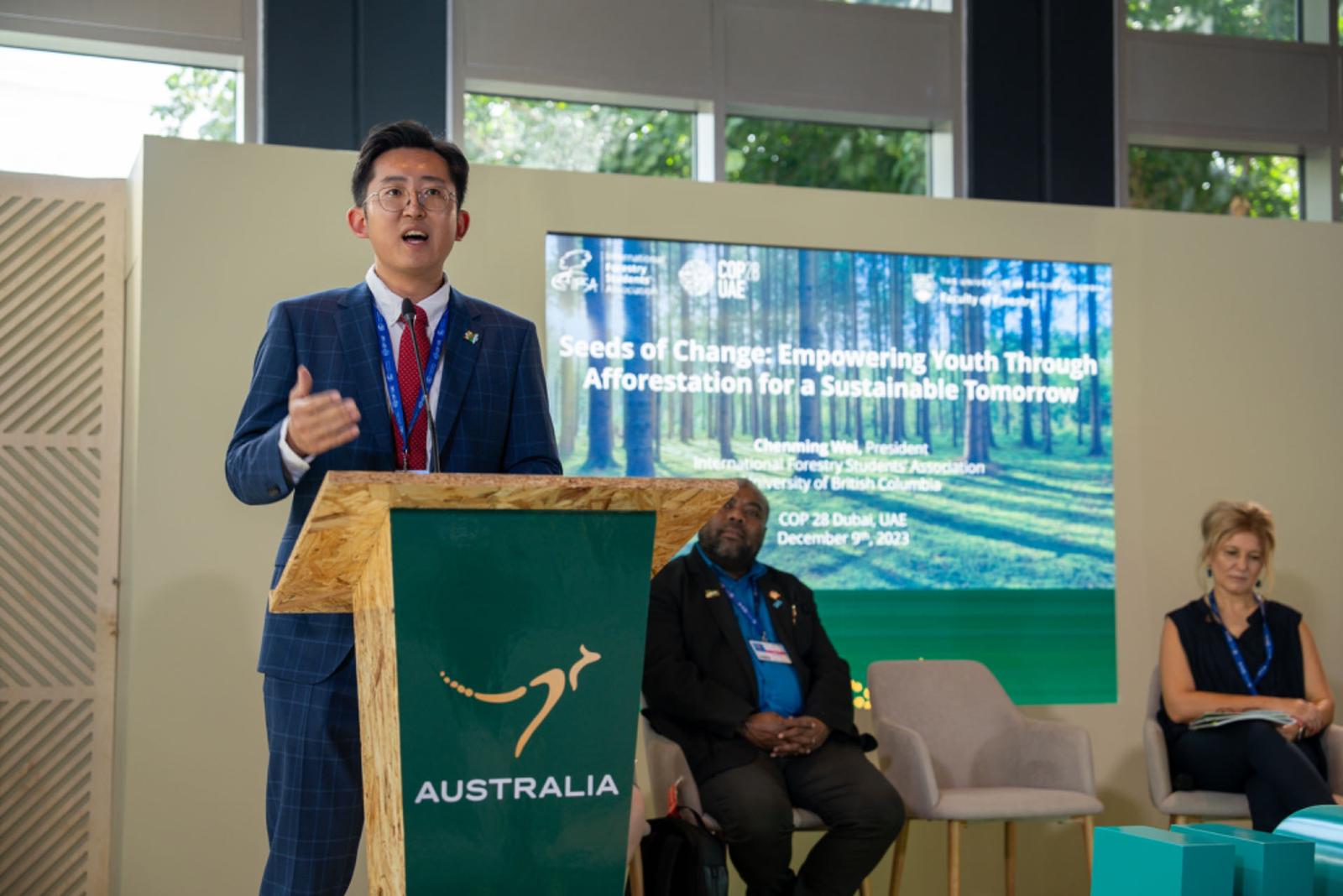
IFSA delegate, Chenming Wei, speaks at the AFPA-led side event at the Australian Pavilion. Photo: IFSA
Chenming Wei, the President of IFSA LC University of British Columbia, delivered a compelling speech that emphasised the critical role of young people in addressing global challenges, particularly in the context of climate change. According to Chenming, afforestation is a powerful tool for sustainable development, combating poverty, and mitigating climate change. He stressed the importance of youth involvement in afforestation projects, citing their potential to create economic opportunities, empower local communities, and enhance resilience. While acknowledging concerns about improper afforestation practices, Chenming highlighted the practicality of afforestation as a vital strategy for addressing environmental issues and preserving the planet’s health.
The panel then addressed the challenges, opportunities, and success stories of sustainable forest management across the Asia Pacific, with a particular focus on the indigenous use and management of forests in Australia.
Community-led Landscape Restoration And Climate Resilience Dialogue
The escalating degradation of landscapes and the concerning decline in biodiversity pose significant global environmental challenges. This emphasises the pressing need to address the worsening condition of our ecosystems. Landscape restoration initiatives revitalise ecosystems, promote sustainable development, enhance resilience, and contribute to community well-being, highlighting the urgent need for action.
The session provided stakeholders a platform to exchange experiences, discuss challenges, and highlight best practices in landscape restoration. At the same time, it encouraged them to share strategies in amplifying multi-sectoral collaboration on community-led land restoration endeavours.
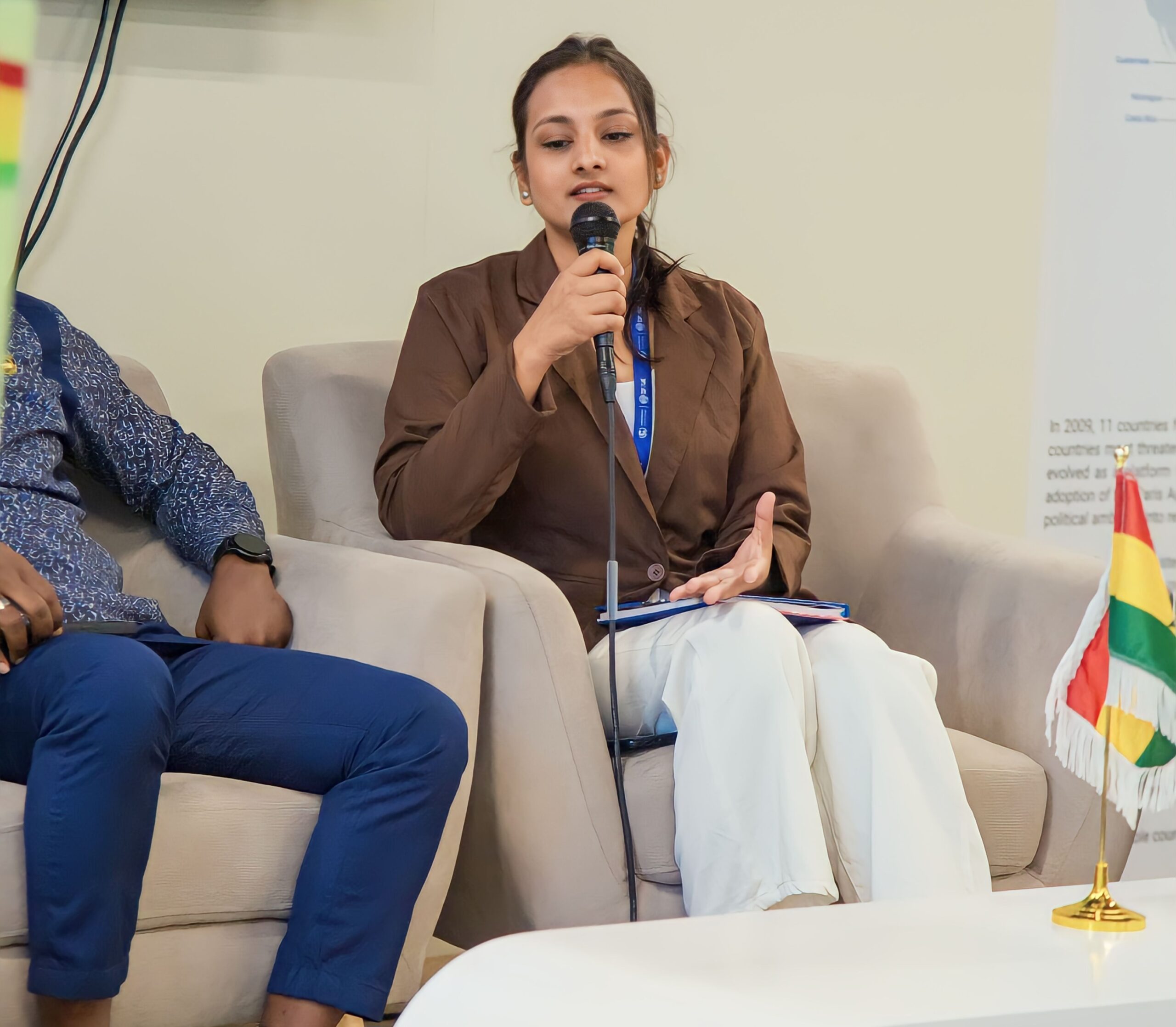
IFSA delegate, Pooja Pokharel, shares her insights on landscape restoration. Photo: Ghana Pavillion
Pooja Pokharel, Former Head of the UNFCCC Sub-Commission, shared IFSA’s work on youth and community-led land restoration projects from Ghana, Nepal, and the Philippines. However, youth-led organisations encounter challenges in implementing projects which is why she acknowledged the importance of community support to ensure its long-term sustainability.
Sustainable Aquatic Food Systems – Food Security within Planetary Boundaries
Aquatic food is often overlooked in the discourse on food and nutrition security. Not only does it have a small environmental footprint, but it also provides high-quality protein and essential micronutrients that are vital for humans’ health and development.

IFSA delegate, Christopher Adjei, shared the youth perspective at the Nordic Pavilion. Photo: IFSA
The discussion emphasised the vital role of aquatic food in enhancing nutrition and overall health, in alignment with the Nordic Nutrition Recommendations. Ms. Anita Utheim Iversen, Head of Global Action Network and Specialist Director at the Norwegian Ministry of Trade, Industry, and Fisheries, set the scene regarding the event’s theme on sustainable food systems, underlining how aquatic food provides key opportunities for food security and nutrition within planetary boundaries. As an advocate for aquatic foods, IFSA delegate, Christopher Adjei, provided some real-life examples on the topic from his coastal community. During his intervention, he portrayed the youth’s deep commitment to natural resources sustainable management, highlighting that young people play a big role in understanding the urgency of action and implementing related practices.
Why Youth Engagement in Decision-Making is Crucial: Advancing Alternative Protein, Food System Policies, and Food Security through Youth Action
Youth needs to be included in the decision-making process, from the policy to ground-level implementation. Food is not only a basic need of life, but also, a cultural expression and connection to heritage in a lot of communities. Although forests play a crucial role in safeguarding the food system and local communities’ livelihoods, it is often overlooked.

IFSA delegate, Esha Mitra, serves as a speaker at IAAS-hosted Side event. Photo: IAAS
Esha Mitra, former Head of the International Processes Commission and Global Focal Point of the UNCCD Youth Caucus, represented IFSA during the session and discussed how forestry also plays a vital role in food security while generating sources of income for communities. According to her, young people who lead land initiatives need to be empowered to continue doing their work on land initiatives and included in policy processes. Nevertheless, the decision-making for food security needs to be more inclusive across sectors, countries, regions, and generations.
World Climate Summit: The Investment in COP
IFSA had the opportunity to participate in the World Climate Summit, held at the Conrad Hotel, Dubai from 7-8 December 2023. The summit emerged as a pivotal event in bringing leaders from the government, business, and civil society together to accelerate the implementation of the Paris Agreement and drive a swift transition to a net-zero economy. The two-day event featured dynamic panel discussions, interactive workshops, engaging side events, and high-level talks. The IFSA delegates optimised their participation at the summit by participating in connecting with multi-sectoral stakeholders during networking sessions and learning from leaders during the plenary sessions.

IFSA delegates participate in the World Climate Summit. Photo: IFSA
IFSA delegates, Isabelle Dela Paz, Pooja Pokharel, and Esha Mitra, proudly represented the association during the summit.
Engagement with other stakeholders
MoU Signing
Australian Forestry Products Association (AFPA)
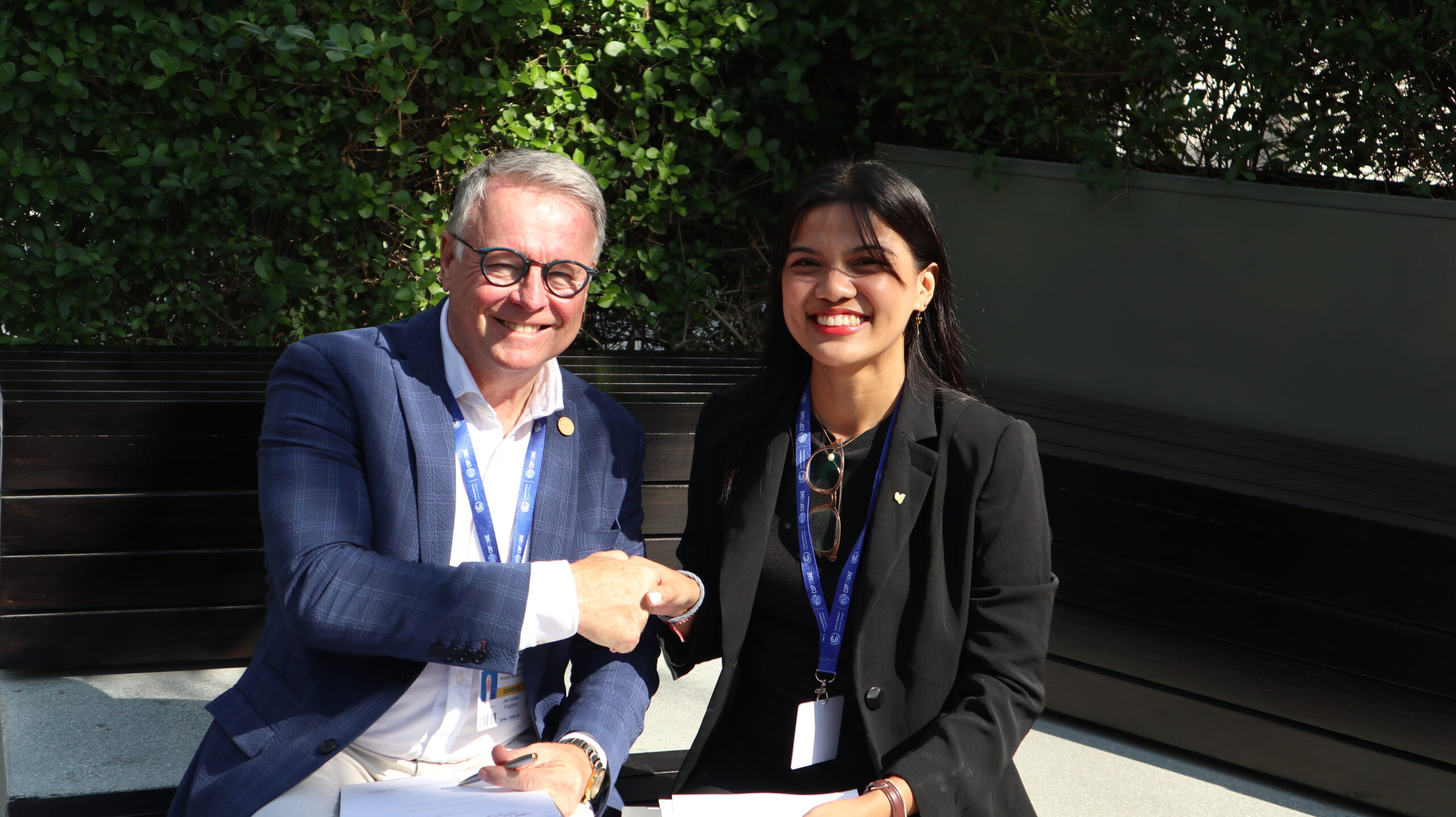
Hon. Joel Fitzgibbon (AFPA CEO) and Isabelle Dela Paz (IFSA President) are signing the Memorandum of Agreement. Photo: IFSA
On 5 December 2023, IFSA signed the Memorandum of Agreement (MoU) with the Australian Forestry Products Association (AFPA), after a year-long preparation that was initiated during COP 27 in Egypt. With our mutual interest in advancing youth involvement in the forestry sector, the partnership aims to collaborate on projects and initiatives that are centered around forestry education and employment.
International Association of Students in Agricultural and Related Sciences (IAAS)
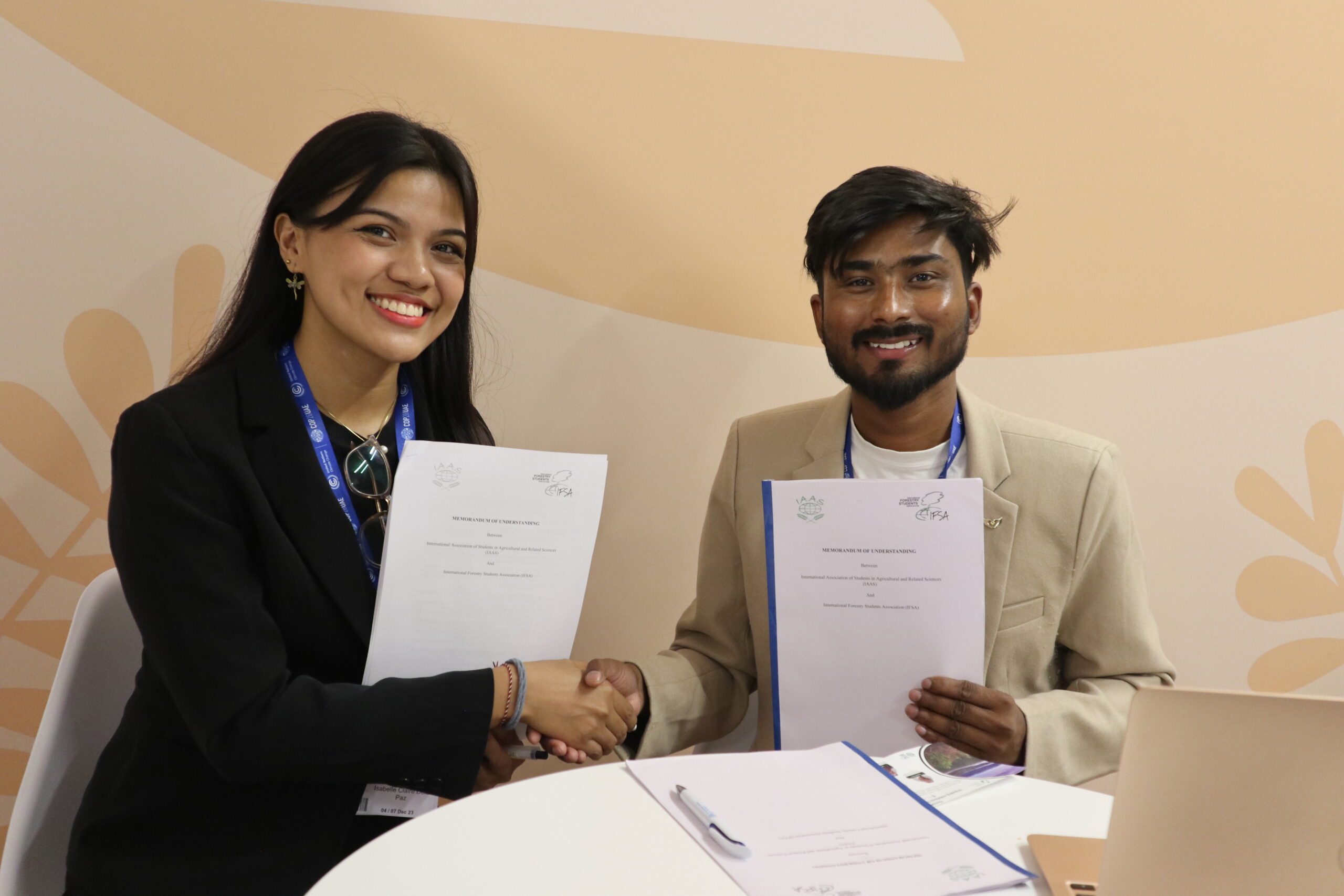
Rabi Raut (IAAS President) and Isabelle Dela Paz (IFSA President) are signing the Memorandum of Agreement. Photo: IFSA
IFSA convened with IAAS, our long-term peer organisation, to sign another MoU. The long-withstanding cooperation of both organisations is primarily focused on collaborating for initiatives that focus on the intersections of forestry and agriculture, as well as opportunities and capacity-building for both IAAS and IFSA members.
Bilateral Meetings
IFSA Partners
On 5 December 2023, the IFSA delegates had the opportunity to personally meet David Ganz (RECOFTC Executive Director) and Regan Pairojmahakij (Senior Program Officer for RECOFTC) to discuss the collaboration plans for 2024 which includes their participation in the 2024 Asia Pacific Regional Meeting in Nepal, and reflect on the co-operations we had in the past term.
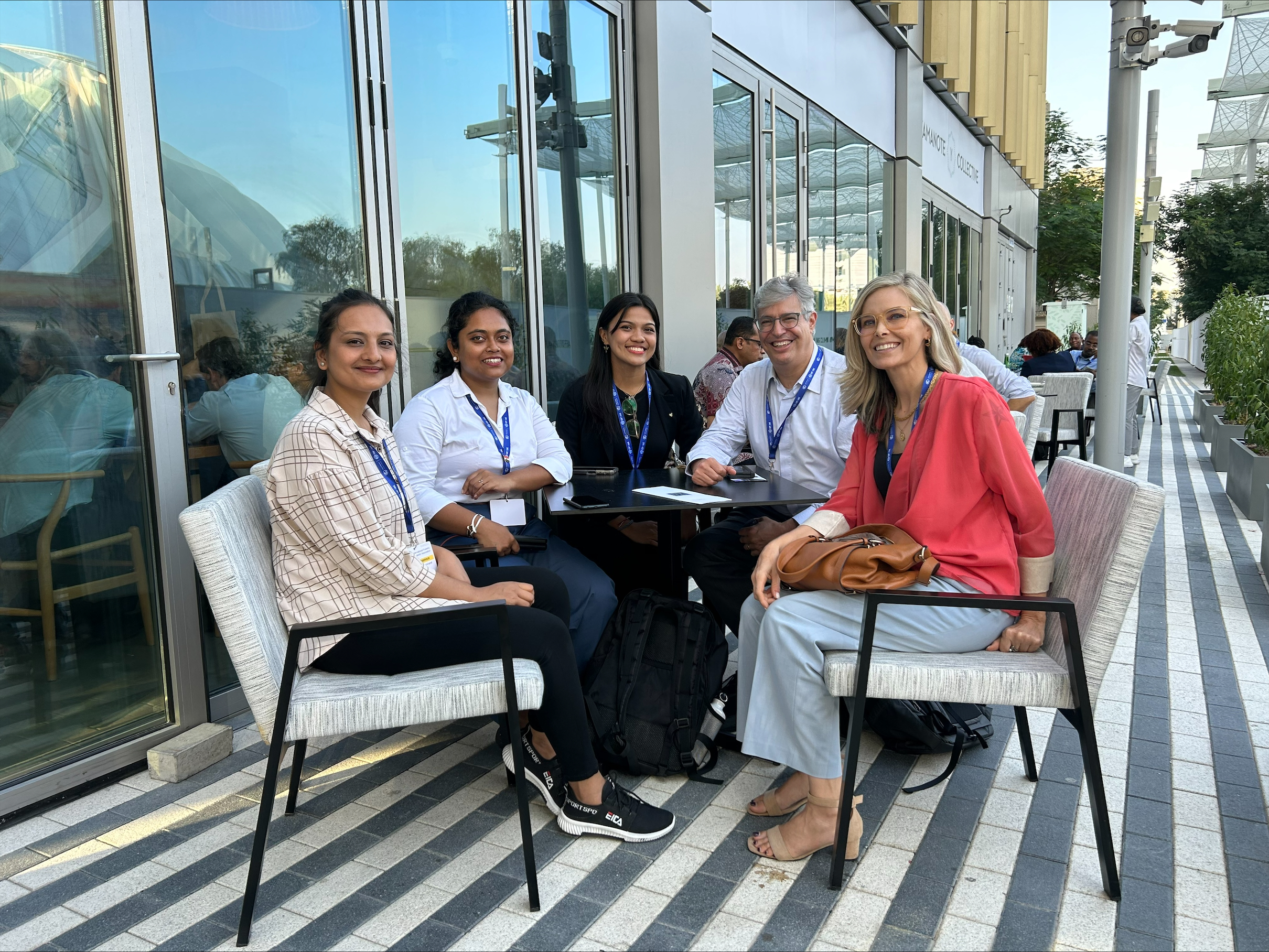
IFSA Delegates meet with David Ganz and Regan Pairojmahakij. Photo: RECOFTC/Regan Pairojmahakij
The delegates convened with ITTO officials, Dr. Ma Hwan-Ok and Simon Kawaguchi, on 6 December 2023 to explore the possibility of new collaboration opportunities and reflect on the partnership for the past terms.

IFSA Delegates meet with Dr. Ma Hwan-ok and Simon Kawaguchi. Photo: IFSA
The IFSA President also attended the GLF Charter Member Meeting in Al Sufouh, Dubai on 7 December 2023, together with other charter members organisations like IUFRO and FAO.
Leading up to the IUFRO World Congress in Sweden in June 2024, the IFSA delegates met with Alexander Buck (IUFRO Executive Director) and Nelson Grima (Deputy Coordinator of IUFRO’s Science-Policy Programme) on 8 December 2023 to discuss our collaboration plans for the event and future direction of the IFSA-IUFRO Joint Task Force.
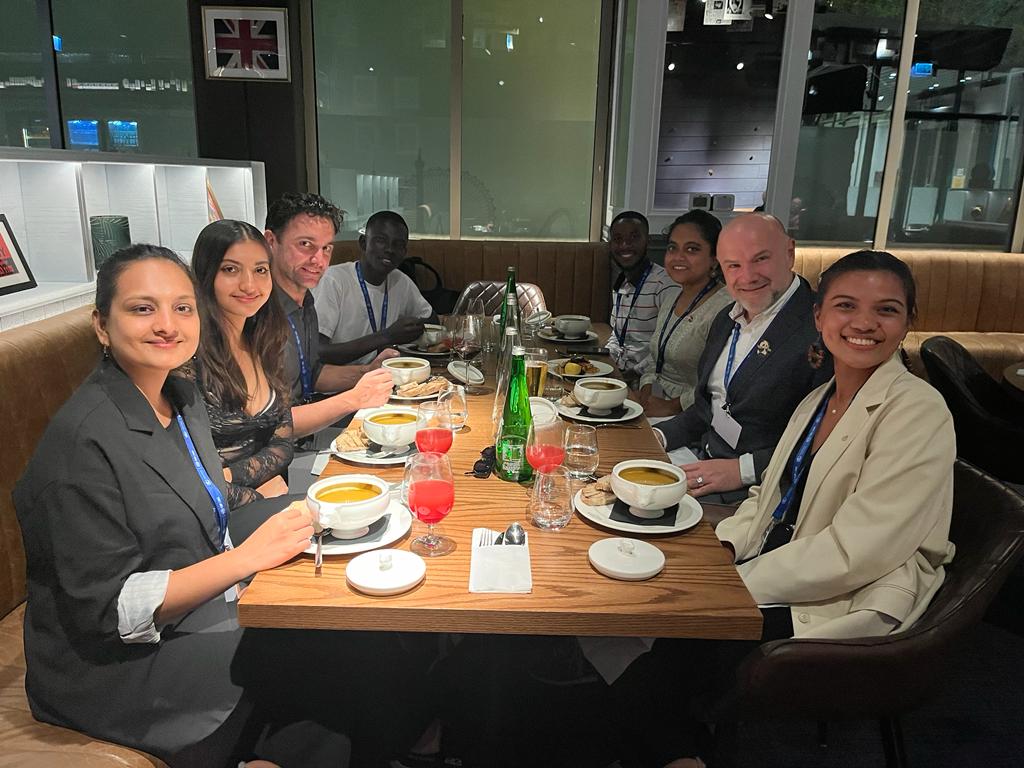
IFSA Delegates are having dinner with Alexander Buck and Nelson Grima. Photo: IUFRO/Alexander Buck
Other organisations
The IFSA delegates had the opportunity to meet with other climate and forestry organisations, specifically 1t.org, Salesforce, Inc., GEF, Coalition for Rainforest Nations (CfRN), International Sustainable Forestry Coalition (ISFC), and CGIAR during COP 28 and talk about the possibilities of future collaboration.
Key outcomes discussed
COP 28 was the first time that discussions on the Global Stocktake were made, in which country leaders and other stakeholders assessed their progress on achieving the Paris Agreement over the last 5 years.
During COP 28, several parties pledged for the operationalization of the loss and damage fund which will support the needs of vulnerable countries to cope with the immense impacts of climate change. In the end, a substantial sum of $700 million was secured for the said fund.
More than 80 countries and stakeholders from various sectors supported the fair, fast, and funded phase-out of fossil fuels. Although COP28 marked the beginning of acknowledging the transition from fossil fuels to achieve “net-zero by 2050”, a complete “phase-out of fossil fuels” was not included in the final agreement after stakeholders from petrostates opposed provisions that mentioned this term. Parties then committed to tripling renewable energy by 2030.
The “global goal on adaptation” framework was also one of the key outcomes of COP 28. This framework aims to create clear targets to guide climate adaptation efforts and enhance support for developing nations. During the session, the negotiators agreed to set time-bound targets for specific themes and sectors on a global scale. However, these were not quantified, nor did they include financial and other kinds of support for developing countries.
COP28 reinforced global commitment to the Glasgow Leaders’ Declaration on Forests and Land Use, with 140 world leaders pledging to halt and reverse forest loss by the decade’s end. The Joint Statement on Climate, Nature, and People was released, outlining commitments to escalate financing, involve Indigenous Peoples, and enhance data collection for tackling climate and nature crises. A plan for Mission 1.5 has been introduced to enhance global cooperation leading up to COP30 which will be hosted by Brazil. Known as the “tropical forests COP”, Brazil attracted attention by revealing a novel proposal for the establishment of the “tropical forests forever” fund.
Though there was a lack of consensus among countries concerning Article 6.2 and Article 6.4, the agreement reached on Article 6.8 was viewed as a great achievement. “We missed an opportunity to expedite the operationalisation of a crediting mechanism that would have set a high bar on environmental integrity, safeguards, and human rights. The delay of the Article 6.4 mechanism is not a victory for environmental integrity, it is a victory for the anti-market agenda,” said Andrea Bonzanni, International Policy Director at IETA. Although the outcome avoids the worst, it doesn’t really make things better, especially with all the voluntary carbon market announcements made during the event. Without the strict standards of regulated UN carbon markets to ensure quality and transparency, these voluntary markets might end up moving away from their climate goals. It’s important to keep a close eye on the impact of these deals until we establish strong rules that turn the current system into a reliable tool for addressing climate issues.
Exactly 189 countries signed the “COP 28 UAE Declaration on Sustainable Agriculture, Resilient Food Systems, and Climate Action” which commits to integrate food into their Nationally Determined Contributions (NDCs) by 2025. This marked a breakthrough in the intersection between food, agriculture, and climate.
Health day was also celebrated for the first time in 28 years of COP history. COP28, in collaboration with the World Health Organization and UAE Ministry of Health and Prevention, has introduced the groundbreaking ‘COP28 UAE Declaration on Climate and Health’ with the endorsement of 123 countries. It places health at the core of climate action, aiming to develop climate-resilient, sustainable, and equitable health systems. The declaration includes significant financial commitments from the Global Fund and the Rockefeller Foundation. Health Ministers attending the UN climate conference signal a shift in climate policies, emphasising the social implications of government decisions. The declaration addresses climate change’s health impacts and potential benefits.
Although efforts are headway, dedicated ambition is needed to limit the warming to 1.5˚C. Additionally, there is a need to shift focus towards translating pledges into actions.
Conclusion
COP28’s global stocktake delivered a stark truth: current NDCs fail to meet the 1.5°C warming limit. While progress exists, the journey towards a sustainable future remains arduous. To bridge this gap, countries must urgently develop more ambitious NDCs before COP 30 and translate policy into action.
As an international association of students from forestry and related sciences, we urge leaders to take immediate action on our following demands:
- Climate-resilient forests: Forest ecosystems provide services that increase the environment and society’s resilience to climate change. Hence, climate-smart forestry initiatives should be integrated into the mainstream agenda of all relevant countries;
- Ecosystem restoration: The rehabilitation of critical ecosystems that have been affected by climate-related catastrophes must be emphasised by scaling up and replicating ecosystem restoration initiatives in pertinent locations;
- Enhancing urban green spaces for improved living conditions: Given the crucial role urban green spaces play in cooling urban temperatures, such spaces must be incorporated into local planning and policies;
- Sustainable forest management practices: unsustainable forest practices persist across the globe, leading to substantial vulnerability to other climate-related events. Therefore, we urge for the integration of sustainable forest management into local practices;
- Livelihood and traditional acknowledgment: Local communities are not only directly affected by the impacts of climate change, but their traditional knowledge is also disregarded in favour of modern technology and market demands. Hence, we advocate for the fair inclusion of indigenous knowledge in research and policy-making through appropriate incentives or initiatives;
- Green job investment: Investments in green jobs and training programs within the forestry sector are crucial to cultivating a proficient workforce dedicated to upholding nature-climate solutions;
- Protect, protect, and protect (3P): It is imperative to ensure the protection of forests and other vital ecosystems against intensive land-use changes by actively involving key stakeholders in all regions; and
- Youth engagement and inclusion: Motivated by our strong idealism, determination, and enthusiasm, we, as the youth, are dedicated to making meaningful contributions across a range of climate actions. Our proficiency in leading climate initiatives underlines our enthusiasm for engaging in diverse decision-making processes.
To read more about IFSA’s statement, you may visit this link.
The youth, inheritors of this planet, cannot be sidelined in this critical hour. Our voices, brimming with vision and passion, must resonate in policy arenas and negotiations. Therefore, IFSA calls upon young people across the globe to step into the policy arena and shape NDCs that reflect our aspirations. Engage actively in negotiations, pushing for solutions that are bold, equitable, and effective.
The future is not something that happens to us; it is something we create, collectively. Remember, every action—no matter how small they may be—holds the power to create a ripple effect. Advocate for sustainable practices, uphold accountability, and inspire others to mobilise for a cleaner and more sustainable future. Together, we can create a world that appreciates forests and their power in addressing the climate crisis on a global scale.
We would like to express our sincere gratitude to the Consultative Group on International Agricultural Research (CGIAR), Global Landscape Forum (GLF), and World Climate Foundation (WCF) for their unwavering support; the Government of Nepal, the Government of Indonesia, the Food Systems Pavillion, the Coalition of Rainforest Nations, and the Food4Climate Pavilion for providing us with a space to host our side events and helping us showcase our initiatives and perspectives on climate and forestry; the Australian Forest Product Association, CIFOR-ICRAF, Eco-Care Ghana, Global Climate Action, International Tropical Timber Organization (ITTO), and other organisers for sharing the opportunity to be a part of their events as speakers; and to the speakers who participated in our sessions as panellists for sharing their valuable insights. We are also grateful to our peer organisations and collaborators IAAS, YPARD, YOUNGO, and Youth4Nature for co-organising joint activities with us and upholding the youth’s perspectives and demands.
